Amour Album by Maurice DENIS
A commentary about the historic context and importance of this portfolio can be found at the bottom of this page, below the images.
A printer-friendly pdf of this information can be downloaded here.
Maurice DENIS (1870-1943)
Amour : douze lithographies en couleurs (original French title)
Love : 12 color lithographs
Color lithograph printed on thin wove chine paper.
Reference: Cailler 107.
Published by Ambroise Vollard, Paris.
Edition of 100.
Signed in pencil.
Approximate paper size: 21 x 17 inches.
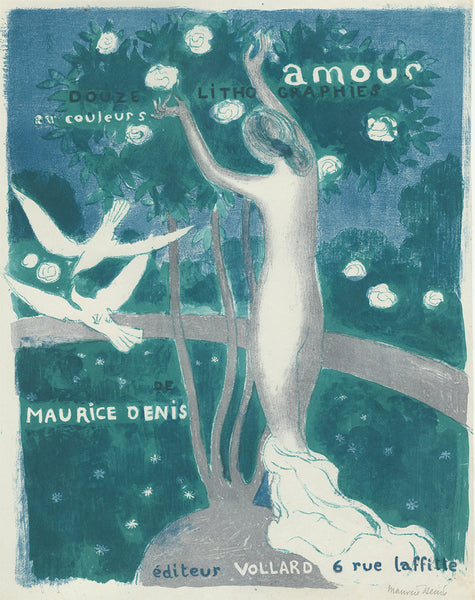
Couverture de l'album (FR)
Cover (ENG)
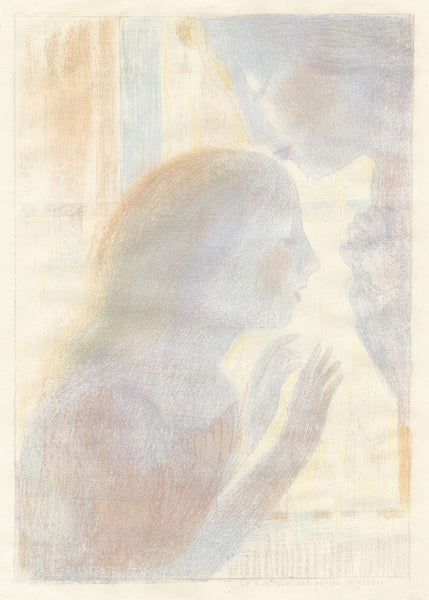
Ce Fut un Religieux Mystère (FR)
It Was a Religious Mystery (ENG)
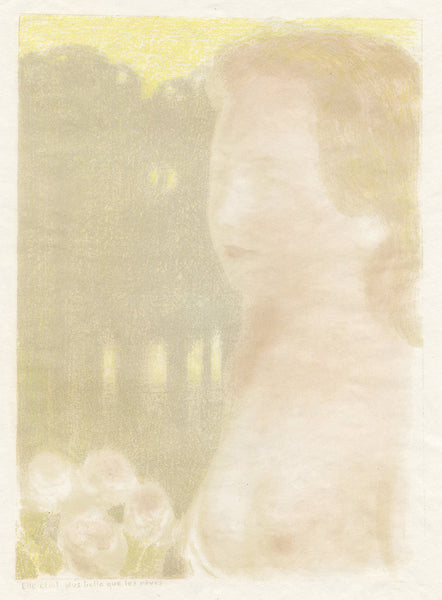
Elle était plus belle que les rêves (FR)
She Was More Beautiful Than Dreams (ENG)
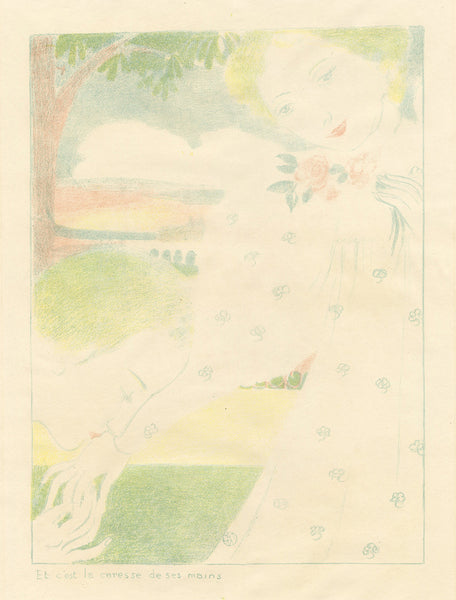
Et ç'Est la Caresse de Ses Mains (FR)
And it is the Caress of His Hands (ENG)
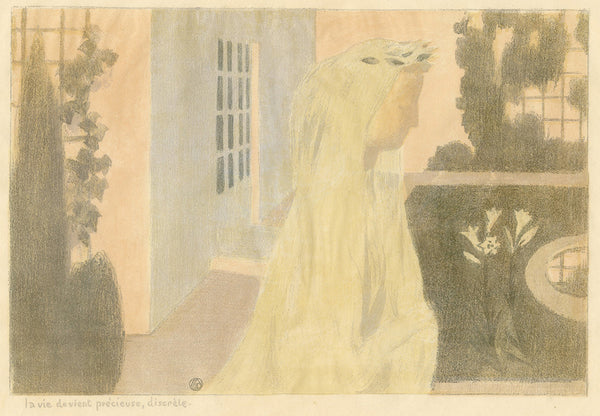
La Vie Devient Précieuse Discrète (FR)
Life Becomes Discreet Precious (ENG)

Le Bouquet Matinal, Les Larmes (FR)
The Morning Bouquet, The Tears (ENG)
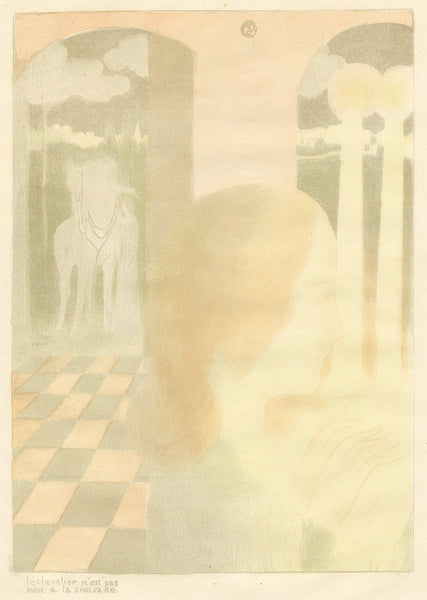
Le chevalier ñ'est pas mort à la croisade (FR)
The knight did not die at the crusade (ENG)
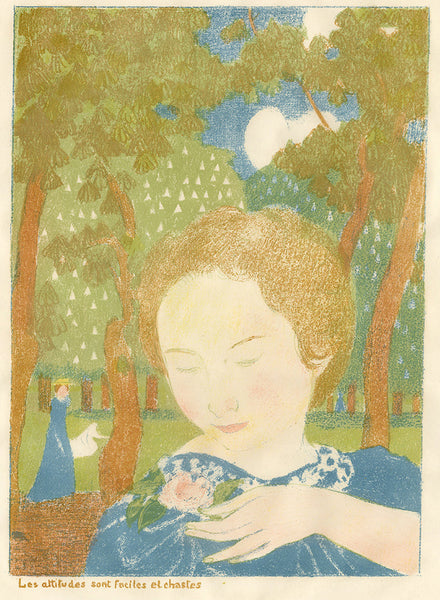
Les attitudes sont faciles et chastes (FR)
Attitudes are easy and chaste (ENG)
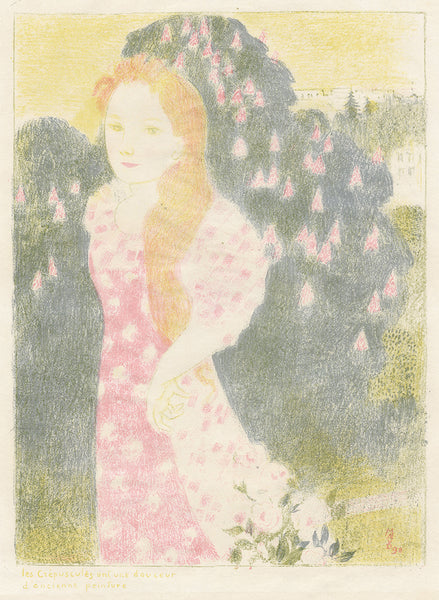
Les crepuscules ont une douceur d'ancienne peinture (FR)
The crepuscules have a softness of old paint (ENG)
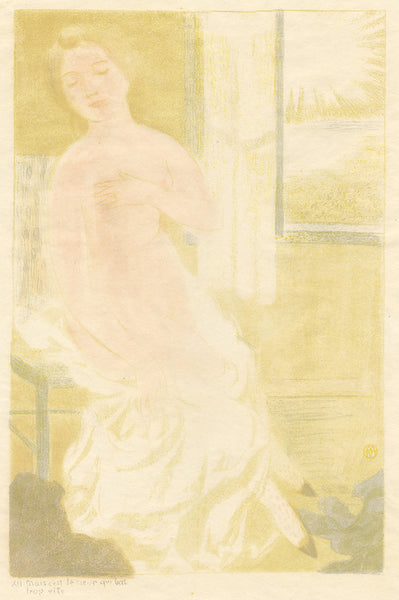
Mais c'est le coeur qui bat trop vite (FR)
But it's the heart that beats too fast (ENG)
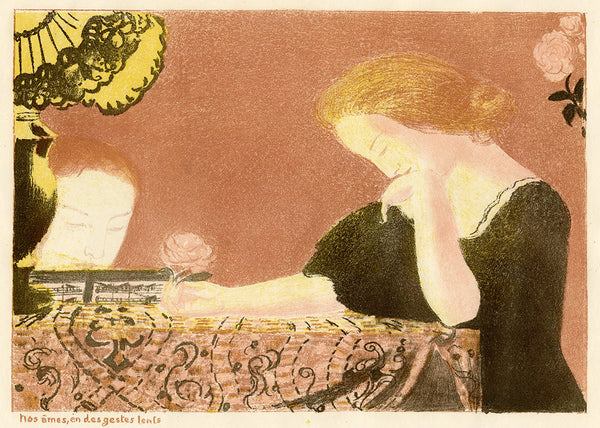
Nos Âmes en des Gestes Lents (FR)
Our Souls in Slow Gestures (ENG)
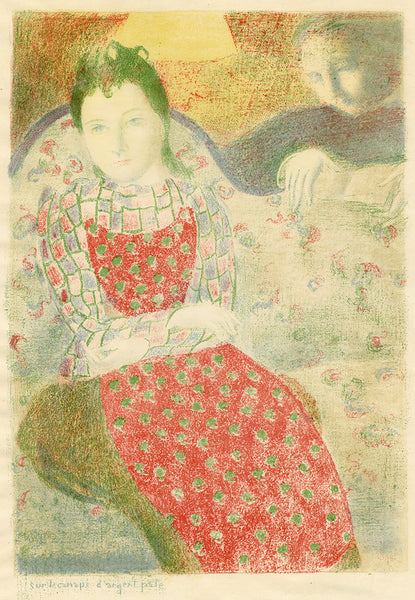
Sur le Canapé d'Argent Pâle (FR)
On the Pale Silver Sofa (ENG)
In 1899 Ambroise Vollard, who was the most important print publisher at the end of the 19th century in France, published an album of 13 color lithographs he had commissioned from Maurice Denis. Amour had been in the works since approximately 1891. The artist had held a journal which he had filled with poetic feelings during his courtship to Marthe Meurier, who became his wife in 1893. The verses he wrote were clearly influenced by symbolist poetry, which Denis greatly admired. These allegorical renderings of his feelings dovetailed perfectly with the religious, mystical and symbolist tendencies found throughout his artistic output.
The resulting set of prints, which was issued loose, and is today mostly found one sheet at a time, has become scarce at a set. Today whole sets are unsurprisingly mostly found in museum collections: Amour is without a doubt Denis’ greatest accomplishment as a printmaker. In these delicate compositions the artist paints a symphony of colors, which range from the faint pastel tones, to saturated ochers, warm sepias, fleshy pink, mauves, cool blues and an array of hues in between, often obtained by superimpositions of translucent colors.
It is often thought that color was the defining element of printmaking in France in the late 1800s and early twentieth century. This is, however far from true. While this era of French printmaking is today mostly defined by color, most printmakers worked monochromatically. The French poster was a notable exception to this fact; but in the realm of fine art prints, black and white compositions were the norm. In this reality, and considering how slowly esthetic appreciation by a wider public evolved, this series of symbolist color lithographs surprises for many reasons; not only the artist’s unusual choice of colors.
Denis depicted the intimate gaze of a young suitor in glorious admiration of a woman, who had become his muse. Translating these emotions, he used his trademark naïve esthetic, stylizing both nature and the human form. The evocative compositions are quiet and charming depictions of a young woman about to enter or recently devoted to married life. The artist, the amorous admirer of the unfolding romance is not visible in any but one of these works of art; but his presence is palpable. His loving gaze is what affords us, the viewer, a glance into this most intimate of moments of a couple’s life, the blossoming love they have for one another, and the devotions of one human being to another.
Like most of Vollard’s projects, this set was not a commercial success. This likely says more about the publisher’s gruff personality, than about his artistic insights. Amour, like the sets of prints by fellow Nabis artists Edouard Vuillard and Pierre Bonnard, and which were also published by Ambroise Vollard, is today regarded as the pinnacle of Denis creativity. These lithographs are some of the most painterly color prints created, evoking effects generally only found in fragile watercolors. These works, however subdued in their effects, hold wall power rarely found color printmaking. It is why they are still so highly regarded today and so eminently collectible.
